- Home
- Mark Hodder
The strange affair of Spring-heeled Jack bas-1 Page 6
The strange affair of Spring-heeled Jack bas-1 Read online
Page 6
"Perhaps you did," countered Palmerston. He glanced down as the instrument on his desk trembled and emitted a puff of steam. "Have you ever heard of Spring Heeled Jack?"
Burton looked surprised. "That never occurred to me!"
Spring Heeled Jack was a bogeyman, a mythical spook used by mothers to scare naughty children into submission: "Behave! Or Spring Heeled Jack will come for you!"
"So a spy dressed as a character from folklore?" Burton reflected. "But why? And why attack me? What interest has he in Lord Russell's suggestion that you make me a consul?"
"He may be rather more than a spy," suggested Palmerston. "Captain Burton, I want you to talk to Detective Inspector William Trounce of Scotland Yard. In 1840, when he was a constable, he was present at the assassination. He claimed to have seen this jumping Jack thing at the scene, and, despite opposition from his superiors, still maintains that the creature is a fact, rather than an illusion caused by panic or hysteria, as others have asserted. It nearly cost him his career. For a decade afterwards, he was the laughing stock of the Yard and only rose to his current position through dogged determination and hard work. You have your albatross; Spring Heeled Jack is his."
Burton spread his arms in a shrug. "Talk to him to what end?"
"As a start to your second assignment. I spoke of a job. Our monarch wants to commission you as-for want of a better word-an `agent.' It's a unique position; you will be required to investigate matters which, perhaps, lie outside of police jurisdiction, or which, due to their nature, require a rather more singular approach than Scotland Yard can offer. You will answer to Buckingham Palace and to me and you will have the authority to command the police when necessary. We live in tumultuous times, Burton. The Technologists are pushing ethical boundaries and the Libertines are pushing moral boundaries. Both castes are too powerful and both have extremist factions. The palace is concerned that science is altering our culture too much and too fast and without proper periods of reflection and consultation. For the good of the Empire, we require someone who can unveil secrets and make snap judgements; someone fearless and independent; someone like you."
"I'm honoured, sir," responded Burton, and he meant it.
"It's not an order. If you don't want the commission, you can have the consulate instead."
"I want the commission, Prime Minister."
"Good. I have an initial assignment for you, but, as I said, I want you to consider this Spring Heeled Jack affair as a second. If there is indeed a spy within the government or at the palace, unmask him! As for the original mission: find out what these are and where they are coming from-"
The prime minister pulled a sheet of paper from his desk drawer and slid it toward Burton. On it there was a rough sketch, in pencil, of a squat, misshapen man with a snoutlike jaw, his face resembling that of a vicious dog.
"You want me to find the artist?" asked Burton.
"No. I know who the artist is-a Frenchman named Paul Gustave Dore. He's buried himself somewhere in the East End where he's been surreptitiously sketching scenes of poverty-God knows why; you know how these artists are, with their absurd notions of the nobility of the poor and whatnot. No, I want you to find the man-wolves."
Burton looked up, puzzled. "Man-wolves? You think this is sketched from life?"
"It is. The royal secretary made it known to Dore that the monarch was interested in his work. In response, the artist has been posting some of his sketches to the palace. This was among them. Look on the back."
Burton turned the sketch over and saw words scrawled in an erratic hand: Your Majesty, there are loups-garous at large in the Cauldron and the people here are greatly afraid. There have been deaths and abductions every night, far beyond that which is usual for this part of the city. The populace hate the police and will not consult them. I have seen one of the loups-garous with nay own eyes. This sketch depicts the thing I saw. It tore out a man's heart as I watched and made away with his boy.
– Dore.
"Good Lord!" exclaimed Burton.
"Personally," said Palmerston, "I think Dore has fallen in with the opium crowd and this is nothing but a drug-fuelled delusion. Maybe you can find out. With your ability to disguise yourself and adopt accents, I thought maybe you could penetrate where the police fear to tread; find this Dore chap and speak to him."
With a rattle and a whistle of steam, a second canister popped up into the contraption on the prime minister's desk. He took it, opened it, read the note, and offered it to Burton.
"Your salary."
Burton looked at the numbers scrawled on the paper.
For the second time that morning, his jaw went slack.
Last night's mist had condensed into a fog, a sickly sulphurous blanket which scratched at Burton's eyes as he waved down a hansom cab along Whitehall. It was one of the new vehicles, pulled by a steam-horse. These four-wheeled engines bore a passing resemblance to the famous Stephenson's Rocket but were a fraction of the size, being about five feet long, three feet wide, and three feet tall, with a thin funnel soaring a full ten feet straight upward. From each end of the front axle two thin, curved steering rods arced up and back to the driver, who sat on his "box" on the top of the cab, which was harnessed behind the engine. Levers on the handgrips controlled the speed and the brakes.
Despite the height of the funnel, smoke still had a tendency to drift into the driver's face, so he wore goggles and a leather cap for protection.
Burton climbed in and gazed out of the window as the hansom chugged away from the curb. The ghostlike forms of London's inhabitants scuttled through the pea-souper, fading in and out of sight as if their very existence was questionable.
His hangover had vanished entirely. He felt strong and positive; he possessed a sense of purpose at last.
Palmerston's final words, though, still echoed in his ears: "This is not a job for a married man, you understand?"
Burton did understand.
Isabel would not.
Penfold Private Sanatorium, which was run by the Sisterhood of Noble Benevolence, was located in St. John's Wood, off Edgware Road.
The hansom drew up near the hospital's entrance and Burton disembarked, handing his fare up to the driver. He mounted the steps and entered the building.
The nurse at the reception desk glanced up at him.
"Oh!" she exclaimed. "Your poor face! But I'm sorry, sir, we don't treat minor wounds here! Can't you see your own doctor? You probably only need your cuts cleaned and some cream on that black eye."
Burton gave a slight smile. "Actually, Sister, I'm here to visit Lieutenant John Speke. Which room is he in?"
She looked surprised. "He's no longer here, sir. They took him last night."
"Took him? Who took him? Where?"
"The-um-his-" She stalled; looked confused. "His family?"
"You're asking me?"
"No! No, sir. I mean to say-yes, his family took him, I believe."
Burton frowned. "Come now! You believe? What's going on?"
"Are you related to Lieutenant Speke, sir?"
"My name is Richard Burton. Perhaps you've heard of me?"
"Oh, I see. Yes, sir, I have. It's that-the thing is-well, the lieutenant was removed from the sanatorium last night while Sister Raghavendra was on duty and she neglected to do the proper paperwork. We have no record of who came for him or where they took him."
"The man was on his death bed! How on earth could she allow his removal without due procedure?"
"She-she said she was taken ill and can't properly recall events, sir."
"Is that so? At what time did this occur?"
"About four in the morning. There were very few staff on duty at the time."
"And Speke was still alive?"
"Yes, sir. Though, in all honesty-and I'm sorry to say this-but it's unlikely that he survived being taken from our care."
"I'd like to see the nurse-Sister Raghavendra-if you please."
"I'm afraid she's not here. She was
suspended from duty and sent home. She was very upset."
"Where does she live?"
"Oh, I can't tell you that, Mr. Burton. It's against policy."
"To hell with your policies, Sister! They obviously count for nothing!"
The nurse's eyes widened in shock. "Sir!"
Burton pulled his wallet from his pocket and took out a folded document. He showed it to the nurse.
"Look at this signature, young lady. Do you recognise it?"
"No. Yes. It's-my goodness!-it's the same as the one on pound notes!"
"Now read this paragraph here," he instructed, indicating a short block of text with his finger.
She did so, pursed her lips, and nodded.
"Very well, sir. It seems I have no choice. Sister Raghavendra lives here-" She scribbled an address onto a sheet of paper and handed it to him.
"Thank you," he said, and turned to leave, satisfied with the effectiveness of the document Palmerston had issued to him that morning.
"Sir Richard!" she called after him.
He looked back.
She smiled. "Rub castor oil around your eye. It will reduce the bruising."
He winked at her.
Outside, Burton found the hansom still standing at the curb. He hailed the driver: "Hi, cabbie, still here?"
"Oh aye, sir. Thought it best to wait for the fares to come to me, 'stead o' drivin' through this stinker lookin' for 'em!"
"Can you take me to 3 Bayham Street, near Mornington Crescent?"
"Wiv me eyes closed, sir-which in this 'ere mess o' fog is just as well. 'Op in!"
Burton settled on the seat and closed the door. He rubbed his itchy eyes as the steam-horse growled and the cabin lurched into motion. His skin felt grimy, thinly coated with soot and other pollutants. He wondered whether Limehouse had been evacuated. During the previous fog-two weeks agotoxic gasses had settled into the Thames basin and a great mob of sailors, criminals, drug addicts, and illegal immigrants-mainly Lascars, Dacoits, Chinamen, Africans, and Irish refugees-had swept into Whitechapel, where they'd rioted for three days. When the fog cleared, and they returned to their hovels and opium dens, it was found that they'd piled hundreds of corpsesasphyxiation victims-along Commercial Road. With the risk of a cholera epidemic and a boom in the already unmanageable rat population, the government had called in the army to clear and burn the bodies. Ever since, the newspapers had been calling for an all-out assault on Limehouse, demanding that it be cleared and razed to the ground. This, thought Burton, was unlikely to happen. The opium trade needed Limehouse and, he suspected, there were powerful forces in the Empire that needed the opium trade.
It took far longer to reach Mornington Crescent than it should have; the cabbie took two wrong turns and, when he finally delivered his passenger to Bayham Street, he seemed beside himself with embarrassment.
"Never done that 'afore, I swears to you, guv'nor!" he moaned. "As sure as me name's Montague Penniforth, I knows every nook and cranny of this ere city! But this `particular' has befuddled me senses! I can 'ardly think straight, let alone guide this smokin' horse in the right direction!"
Burton knew what the man meant; some ingredient in the fog was causing him to feel slightly dizzy too, which, after a hard night's drinking, was the last thing he needed.
"Don't worry yourself about it, Mr. Penniforth," he said. "Here's a couple of bob extra. Why don't you pack up for the morning? Go spend some time with your missus!"
"Cor blimey!" Penniforth coughed. "You must be jokin'! Daisy would have me guts for garters if I turned up on the doorstep 'afore midnight. She can't stand the sight o' me!"
Burton laughed. "Wait here, then, if you don't mind. I shan't be long and I promise you another shilling!"
"Me lucky day!" The cabbie grinned. "I'll 'ave a draw on me pipe while I wait; get some decent fumes into me lungs!"
Burton left Montague Penniforth cleaning out the bowl of a filthy old cherrywood and crossed the pavement to peer at the house numbers. Number 3 was a four-storey terrace. A dim glow emanated from the fanlight window above the front door. He yanked at the bellpull and heard a distant jangle.
After a minute, the portal was opened by an elderly woman in mourning dress, her face concealed behind a weeping veil of black crepe.
"Yes?" she whispered. There was an edge of suspicion to her voice, for though her visitor was obviously a gentleman, his face was cut, bruised, and barbarous in aspect.
"My apologies, ma'am," said Burton, courteously. "Do you have a Sister Raghavendra here?"
"Yes, sir. On the third floor. Are you from the sanatorium?"
"I've just come from there, yes," he replied. It wasn't quite an answer to the question she'd asked but she didn't seem to notice and appeared to be mollified by his deep, polite, and melodious voice.
"If you wish to see her, sir, I should act as chaperone," she noted, in her frail tones.
"That will be acceptable, thank you."
"Pray, come in out of the fog, then. You can wait in the hallway."
Burton ran the soles of his shoes over the iron boot-scraper on the doorstep then stepped into the dingy hall, the walls of which were crowded with framed paintings and photographs, display plates and crucifixes. The landlady closed the door behind him and took a small silver finger-bell from her sleeve. In response to its tinkling ring, a sturdy young girl hurried out from the parlour. Flour powdered her hands, forearms, and nose. She gave a clumsy curtsey.
"Mum?"
"Run up to Sister Raghavendra, Polly, and tell her she has a visitor; a Mr.-?"
"Captain Burton." He always preferred to use his military rank; "Sir Richard" sounded a mite pretentious.
"A Captain Burton. You may advise Sister Raghavendra that I will escort the gentleman up to her sitting room if she wishes to receive him."
"Yes, Mum!"
The maid thumped up the stairs and out of sight.
"An ungainly girl but she serves me well. My name is Mrs. Emily Wheeltapper, Captain. My late husband was Captain Anthony Wheeltapper of the 17th Lancers. He fell at Balaclava. I have been in mourning these seven years since. He was a fine man."
"My sympathy, ma'am."
"Will you take a cup of tea, Captain?"
"Please don't trouble yourself. My business will be brief."
"Is the poor girl in difficulty? She came home in tears this morning. Has something happened at the sanatorium?"
"That's what I'm here to find out, Mrs. Wheeltapper."
Polly's heavy tread thundered down the stairs. "She says to come on up, Mum," she reported.
"Thank you, Polly. Now back to the kitchen with you. Those scones won't cook themselves. Follow me, please, Captain Burton."
The old widow slowly ascended, followed patiently by her visitor.
On the third landing, they were met by Sister Raghavendra. She was, Burton guessed, in her midtwenties. She was also extremely beautiful, with dark almond-shaped eyes and dusky skin. Her nose was small and straight; her lips full and sensual, with a squarish shape more often found in South Americans; and her black hair, though pinned up, was obviously very long and lustrous.
His nostrils detected the scent of jasmine.
She reminded Burton of a Persian girl he'd once bedded, and a thrill of desire rippled through him as her eyes met his.
"You are Captain Burton?" she asked, in a soft, slightly accented voice. "You are here about Lieutenant Speke, I suppose? Come into my sitting room, please."
He followed her into a small and sparsely ornamented chamber and sat in the armchair to which she gestured. She and Mrs. Wheeltapper settled onto the sofa.
He noticed a statuette of Ganesha on the mantelpiece; a nurse's headdress had been thrown carelessly onto a table; a small bottle of laudanum on a dresser.
Sister Raghavendra sat with her back held very straight and her hands folded gracefully on her lap. She was still in her work clothes: a floor-length, high-collared, and long-sleeved pale grey dress over which she wore a s
hort white jacket.
"With Mrs. Wheeltapper's permission," said Burton gently, "I would like to ask you about the events of last night, when John Speke was removed from the sanatorium."
The old widow patted her lodger's hand. "Is that all right with you, my dear?"
"Perfectly," answered the nurse, with a trace of imperiousness in her voice. "I will answer any question as best I can, Captain Burton."
"I'm happy to hear that. Perhaps you could tell me what occurred?"
"I'll tell you as much as I know. I came on duty at midnight. My shift is from twelve until six. I was assigned to Lieutenant Speke, my duty being simply to sit with him and monitor his condition. Forgive me for being blunt, Captain, but he wasn't expected to live for long; the left side of his face and head were extremely badly damaged. The presence of a nurse was not entirely necessary in a medical sense, for there was nothing that could be done to save him, but it is our practice never to leave a dying man alone in case he recovers himself in his final moments to make a statement or request or confession."
"I understand."
"I passed four hours reading to him and was then interrupted by a man who entered the room."
She paused and put a hand up to her throat, took a breath, and continued, "I cannot describe him. I cannot see him in my mind's eye. I remember-I remember only his soft tread as he came in, then-I-I-"
Droplets of sweat appeared on Sister Raghavendra's forehead. She bit her lip and pulled at her collar.
"Did I faint?" she asked. "But why should I have done so?"
"What is your next clear memory?" asked Burton.
"I was-was, um-I was inside the entrance by the reception desk, wheeling a trolley past it, and, somehow, I felt satisfied that Lieutenant Speke was in good hands."
"Whose?"
"Well, I thought his family's but-I-I don't know!" She lowered her face into her hands.
Mrs. Wheeltapper stroked her tenant's arm and crooned wordlessly.
Sir Richard Francis Burton had not only listened to the girl's words; he'd also been absorbing her accent, and with the phenomenal skill that was his, had identified her-or at least her family-as native to the Mysore region of Southern India; specifically, to the Bangalore district.

 The Secret of Abdu El Yezdi
The Secret of Abdu El Yezdi The Return of the Discontinued Man
The Return of the Discontinued Man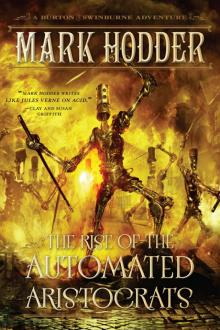 The Rise of the Automated Aristocrats
The Rise of the Automated Aristocrats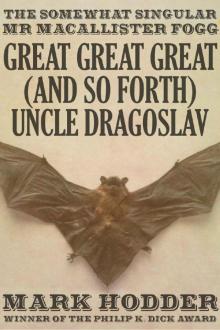 Macallister Fogg 2: Great Great Great (And So Forth) Uncle Dragoslav
Macallister Fogg 2: Great Great Great (And So Forth) Uncle Dragoslav Sexton Blake and the Great War
Sexton Blake and the Great War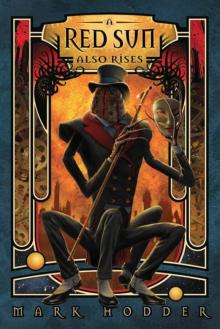 A Red Sun Also Rises
A Red Sun Also Rises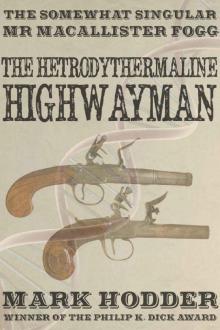 Macallister Fogg 3: The Hetrodythermaline Highwayman
Macallister Fogg 3: The Hetrodythermaline Highwayman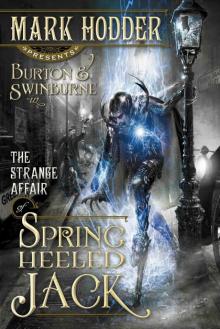 The Strange Affair of Spring Heeled Jack
The Strange Affair of Spring Heeled Jack Macallister Fogg 1: The Master Mummer's Mummy (The Adventures of Macallister Fogg)
Macallister Fogg 1: The Master Mummer's Mummy (The Adventures of Macallister Fogg)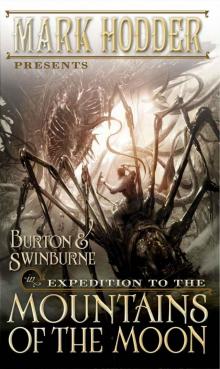 Expedition to the Mountains of the Moon bas-3
Expedition to the Mountains of the Moon bas-3 The Return of the Discontinued Man (A Burton & Swinburne Adventure)
The Return of the Discontinued Man (A Burton & Swinburne Adventure)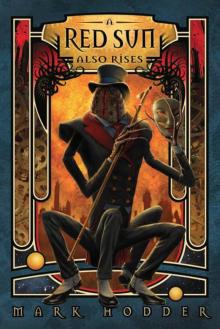 Red Sun Also Rises, A
Red Sun Also Rises, A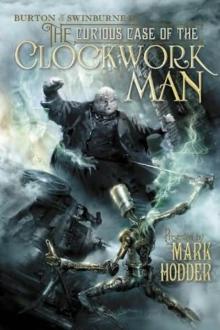 The curious case of the Clockwork Man bas-2
The curious case of the Clockwork Man bas-2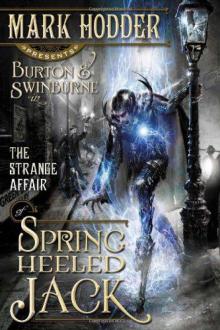 The strange affair of Spring-heeled Jack bas-1
The strange affair of Spring-heeled Jack bas-1